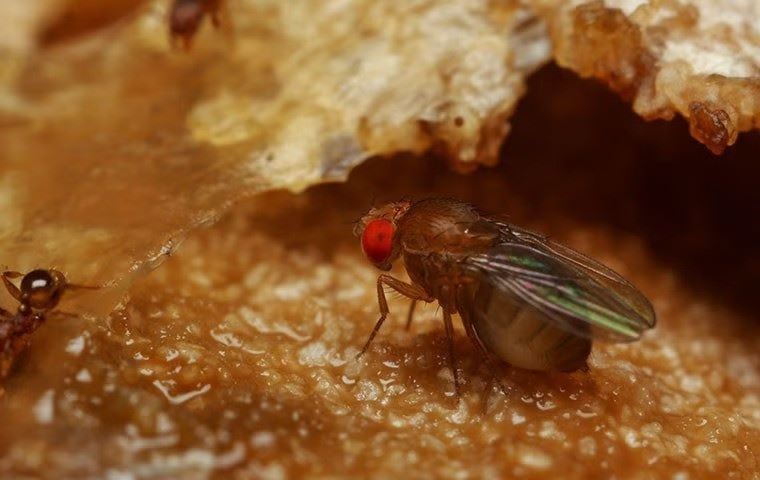
Small Fruit Flies
Get started with a free, no obligation quote!
Small Fruit Fly Identification & Prevention
Also known as the vinegar or pomace fly, these flies are common around aged fruit and soda can recycling bins.
Description

Adult fruit flies are about 1/8 of an inch (3mm) long, with bright red eyes, tan heads and thoraxes, and blackish striped abdomens. Like all flies, they develop by complete metamorphosis. The female deposits eggs (as many as 500) on the surface of fermenting organic material. Larvae can begin to emerge in as little as 30 hours later. Fruit fly larvae are small, legless white maggots that have a pointed end. The larvae will feed for five to six days and then crawl to a dry area to pupate, with the adult emerging a few days later. The entire life cycle can take as little as eight days under ideal conditions.
Biology and Behavior
- Fruit flies are primarily attracted to fresh and fermenting fruits and vegetables and other rotting, fermenting organic materials.
- Because the adult frequents unsanitary conditions, fruit flies are a significant health concern as they can transfer disease-causing bacteria to food.
- Small fruit fly larvae ingested from infested fruit can cause intestinal discomfort and diarrhea by intestinal myiasis.
- One rotting piece of fruit can produce hundreds of flies. So all that is needed is one damaged apple in a box, one overripe banana at the bottom of a fruit bowl, or one onion dropped and forgotten under a cabinet to cause an 'explosion.'
- Recycle bins and trash receptacles, and soda fountain drains, refrigerator condensate pans, non-skid floor mats, garbage disposals, and sometimes floor drains are common sites in commercial kitchens.

What's the Action Advantage?
Find Out What Makes Us Different!
-
Environmentally-Friendly Products Available
-
After-Hours Answering Service Available
-
70+ Certified Pest Management Professionals
-
Trusted by the Community Since 1946